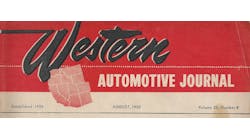When he’s asked about what makes him passionate about the collision repair industry, Ron Zappetillo laughs.
“That’s easy—I love people and I love cars. That’s what it’s all about,” he says.
Zappetillo serves as a CARSTAR area manager of operations who oversees 30-plus shops and provides them with consulting and guidance. He’s worked in pretty much all aspects of collision repair, from a technician to an estimator to a manager, in independent shops as well as MSOs, and was an I-CAR instructor, as well. He’s been in the industry for nearly three decades now.
“And I’m 46,” Zappetillo jokes. “So, more years in the industry than I’ve been not in the industry now.”
Zappetillo’s consulting work ensures that every day is unique from the next. And, that keeps him passionate about his role.
“It makes me feel good; just being a part of an industry that I love and I’m passionate about is awesome,” Zappetillo says. “I don’t know why anybody would want to come to work and have a bad day.”
Here are Zappetillo’s top tips for consulting and training with shops that fall under his purview.
Be a lifelong learner.
Zappetillo dedicates time each week to being a student. Whether that means he’s reading an article, going to a training session, using CARSTAR’s resources, or anything else, he wants to make sure there’s always a set time for him to keep learning.
He knows all of the shops and their employees don’t learn in exactly the same way, and also works to make sure they can still learn from his style of teaching.
“We have to look at what motivates them and help them see that the training that you’re trying to provide will help achieve their goals, and mold it to that direction,” Zappetillo says.
Some people are hands-on learners, while some are better learning from books, but Zappetillo knows he has to adapt his training to align with that. And, ultimately, that flexibility helps people want to train.
“If they know their goal is going to be achieved if they learn this process or learn a different way to do it, that makes them excited and motivated,” Zappetillo says.
Do your research.
Before he gets to a shop, Zappetillo makes sure that he researches the business thoroughly.
“KPIs, scorecards, financials, websites, prior notes, anything like that,” Zappetillo says. By researching such information, he adds, “I can get a story of where they’ve been and where they’re currently at today.”
Zappetillo reviews all of the information with the owner, taking care to listen and understand what their goals are and what they want to do going forward.
“Together, we put a realistic action plan that works toward that goal,” Zappetillo says. “Of course, following up with them and holding them accountable to that action plan is key.”
Zappetillo describes his consultative style as working together with owners to adapt a solution that could possibly work for them.
Recognize what’s possible.
Zappetillo consults a wide variety of shops, some small and some large, and has to adjust how he trains based on what the shop’s various capacities are.
“Because of the diverse customers or shops that we have, some shops are very advanced and have multiple layers and things going on that a smaller shop might not,” Zappetillo says. “So, when I’m explaining it to them, I’m also keeping in mind what they have going on.”
Embrace the evolving industry.
“The attitude of, ‘we’ve always done it that way’ just doesn’t work anymore,” Zappetillo says. “People as a whole need to dedicate time to keep up on the new advances and changes within our industry, seeing how it’s ever-changing.”
Zappetillo sees the industry’s shops as all being on a similar level right now, because much of the technology involved is new to everyone. Shops across the country have to start new with all the advances.
Zappetillo encourages shop owners to keep learning and commit time to being a student of the industry.
“Even if you’ve been to [a training] a few times, or been to something like it, there’s usually that nugget of information that you take away,” Zpapetillo says. “When you’re really looking for that nugget of information intentionally, you’ll usually find something.”
Zappetillo wants to remain a student of the industry, and takes his role as a consultant seriously by passing down what he’s learned to shop owners.



